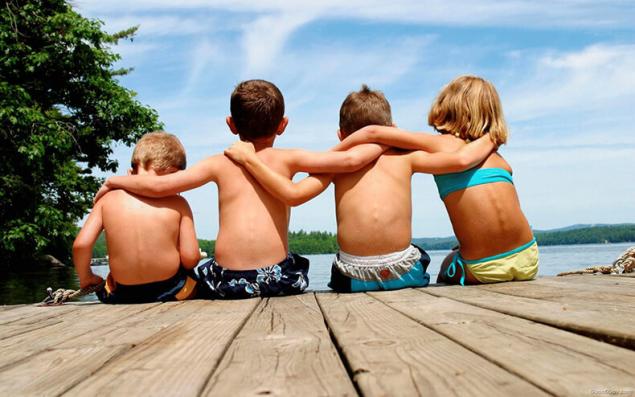476
Whether your friends are friends
Scientific studies show that we often perceive distorted friendship.
Think of all those with whom you have to communicate throughout the day, week, month, year. About those with whom you exchange a passing greeting or the warm hugs; talking about nonsense or raise the most profound topics. About people who, for some whim of destiny to inhabit your world. And then ask yourself, which one you can call your friends — your true friends.

Recent studies show that only about half of those whom we consider friends, love us back. Someone you call a friend, may in fact treat you pretty cool. Conversely, the person you like barely know might believe you do not spill water.
This startling discovery caused a lot of debate among psychologists, neuroscientists, and experts in behavior in the working environment, sociologists and philosophers.
Some say that this gap between the real and the apparent friendship is to blame ineradicable optimism, if not self-centeredness inherent in all human beings. Others point to a wrong understanding of the concept of friendship in the age when friends are the people from the social networks that we can never in life is not to share the word, and the transition between different social circles happens a wave of the hand on the smartphone screen. This can not worry, because the quality of our relationships has a huge impact on our health and well-being.
Alex Pentland, an expert in computer methods in sociology from Massachusetts Institute of technology — one of the authors of a study published in the journal PLoS One under the title, "Friend do you for your friends? Misperceptions of friendly relations limits the ability to change behavior." He says:
"People don't like the idea that those whom they perceive as friends, their own friends do not believe".
The study analyzed the relationship between the 84 subjects aged 23 to 38 years. All of them belonged to the class of business managers. They were asked to rate each other on a scale of proximity — from "I don't know this person" to "This is one of my best friends." It turned out that the rating was mutual, only 53% of respondents, while they themselves assumed that their feelings are mutual, in 94% of cases.
This is consistent with the data rows of other studies of friendship conducted over the last decade: with a total sample of more than 92 thousand respondents, the level of reciprocity in these studies ranged from 34% to 53%.
According to Pentland, "the likelihood that non-reciprocal friendship, challenges our notion of the self". But perhaps first and foremost is the problem associated with blurred understanding of friendship. Ask the person how he defines friendship, and even scientists like Pentland are studying this subject, I will answer you with awkward silence or a thoughtful "hmm".
Alexander Nehamas, Professor of philosophy at Princeton University, in his recent book "On friendship" (On Friendship) devoted to the search of such a definition almost 300 pages — and even he says:
"Friendship is hard to describe. Easier said than friendship is not — and, above all, it has nothing to do with other people".
Friendship is not a way to get higher status, to snatch an invitation to someone's country house or just to avoid boredom. Rather, according to Nehamas, friendship is more like beauty or art: it ignites something deep within us and "valuable in itself".
However, one of the most famous treatises on friendship, "How to win friends and influence people," Dale Carnegie tells us exactly how to use others to their advantage. Pop stars like Taylor swift and Drake praise for their ability to "make friends" with the strategic, if not promotional, purposes. And of course, social media has become platforms where we show a friendly attitude to enhance personal image.
Ronald sharp, a Professor of English in Vassar College and teaches a course on friendship in literature. He says:
"Perceiving friends as an investment or commodity, we are destroying the very idea of friendship. It's not about what someone can do for you, it's about who and what you two become in each other's presence".

He recalls many hours spent in exciting talks with her friend Odoreu Welty, who was known not only for the Pulitzer prize in fiction, but also her capacity for friendship. Together they have compiled an extensive anthology of writings on the subject — "Northsky friendship book" (The Norton Book of Friendship). Sharp says:
"The ability not to do anything but spend time in the company of each other, became, in a sense, a lost art"—it was replaced by the volley fire of messages to the messengers. "People are so eager to maximize the effectiveness of their relationships that no longer understand what it means to be a friend".
By definition, friends are people you are willing to learn to understand and which allow us to understand you.
Our time is not infinite, so the number of friends we can have, is also limited, says British evolutionary psychologist Robin Dunbar. He describes the layers of friendship, where the top layer consists of one or two people — say, a spouse and a best friend, with whom you communicate every day and feel the greatest intimacy.
The next layer can accommodate a maximum of four people: you have a lot in common, you are tied to them, care about them and try to maintain contact at least once a week. On each following layer is more random friends to whom you wish to devote less time and with whom, as a rule, have less deep and strong relationship. Without constant contact, they can easily move into the category of "friends". Perhaps they are truly cute, but they cannot be called friends. Dunbar says:
"The amount of time and emotional capital we have is limited, so we only have five seats available for the most intensive relations. People often say that they have more five closest friends, but you can be sure that it is not genuine friendships".
Boasting a number of friends, we are trying to show their popularity — because in our culture it is believed that to rely on someone is a sign of weakness, but power is the ability not to allow others to affect us. But friendship requires a certain vulnerability, through which concern. Close to friends we should open about themselves and things that do not match the carefully built image in Facebook or Instagram, says Nehamas. The belief that your connection will remain and may even grow stronger in spite of your flaws and inevitable failure, he said, that's a risk many are not willing to accept.
Doctors say that trying to protect yourself with shallow or non-reciprocal relationship, we can obtain physical consequences. The feeling of loneliness and isolation increases the risk of premature death by about the same extent as Smoking, alcoholism and obesity; moreover, it may badly affect the condition of one of the departments of the vagus nerve, which, in the opinion of some researchers, allows us, among other things, to maintain a sincere and mutual relations.
Amy Banks, a psychiatrist at the Wellesley Centers for Women, specializiruetsya on the new science of interpersonal neurobiology. She wrote the book "what unites us: the unexpected connection between neurobiology and healthy relationships" (Wired to Connect: The Surprising Link Between Brain Science and Strong, Healthy Relationships). Banks says:
"It is very important to maintain a good condition of the vagus nerve because it regulates our instinctual response of "fight, flight or freeze"".
One of the biggest mysteries: why with age the time of "accelerated"
That is a betrayal on the energy level
According to her, in the presence of the other is the vagus nerve responsible for the sense of security and comfort — in contrast to the regime of high alertness, which is included alone with a stranger or someone whose judgment we fear. It helps us at the right moment to expose the vulnerable places of the psyche, and it helps us to feel the moment in the event of a conflict.
If you are unfamiliar with the genuine friendship, your vagus nerve will not work properly. You will constantly be on edge, and as a result, take in a deep relationship you will be even more difficult.

Therefore it is necessary to determine who, exactly, of all the people you encounter in life, really can be considered friends. Who always finds time for you? Communication with anyone makes you a quicker, better and maybe even tone it down? Who would you miss? Who would miss you?
Although there is no simple, accepted definition of friendship, and all friendships have one thing in common: they shape us and reveal to us new ways of looking at the world. This may manifest itself in greater or lesser degree depending on who we choose as friends. As they say, "tell me who your friends are and I'll tell you who you are".published
P. S. And remember, just changing your mind — together we change the world! ©
Source: insider.pro/EN/lifestyle/2016-08-08/dejstvitelno-li-vashi-druzya-eto-druzya/
Think of all those with whom you have to communicate throughout the day, week, month, year. About those with whom you exchange a passing greeting or the warm hugs; talking about nonsense or raise the most profound topics. About people who, for some whim of destiny to inhabit your world. And then ask yourself, which one you can call your friends — your true friends.

Recent studies show that only about half of those whom we consider friends, love us back. Someone you call a friend, may in fact treat you pretty cool. Conversely, the person you like barely know might believe you do not spill water.
This startling discovery caused a lot of debate among psychologists, neuroscientists, and experts in behavior in the working environment, sociologists and philosophers.
Some say that this gap between the real and the apparent friendship is to blame ineradicable optimism, if not self-centeredness inherent in all human beings. Others point to a wrong understanding of the concept of friendship in the age when friends are the people from the social networks that we can never in life is not to share the word, and the transition between different social circles happens a wave of the hand on the smartphone screen. This can not worry, because the quality of our relationships has a huge impact on our health and well-being.
Alex Pentland, an expert in computer methods in sociology from Massachusetts Institute of technology — one of the authors of a study published in the journal PLoS One under the title, "Friend do you for your friends? Misperceptions of friendly relations limits the ability to change behavior." He says:
"People don't like the idea that those whom they perceive as friends, their own friends do not believe".
The study analyzed the relationship between the 84 subjects aged 23 to 38 years. All of them belonged to the class of business managers. They were asked to rate each other on a scale of proximity — from "I don't know this person" to "This is one of my best friends." It turned out that the rating was mutual, only 53% of respondents, while they themselves assumed that their feelings are mutual, in 94% of cases.
This is consistent with the data rows of other studies of friendship conducted over the last decade: with a total sample of more than 92 thousand respondents, the level of reciprocity in these studies ranged from 34% to 53%.
According to Pentland, "the likelihood that non-reciprocal friendship, challenges our notion of the self". But perhaps first and foremost is the problem associated with blurred understanding of friendship. Ask the person how he defines friendship, and even scientists like Pentland are studying this subject, I will answer you with awkward silence or a thoughtful "hmm".
Alexander Nehamas, Professor of philosophy at Princeton University, in his recent book "On friendship" (On Friendship) devoted to the search of such a definition almost 300 pages — and even he says:
"Friendship is hard to describe. Easier said than friendship is not — and, above all, it has nothing to do with other people".
Friendship is not a way to get higher status, to snatch an invitation to someone's country house or just to avoid boredom. Rather, according to Nehamas, friendship is more like beauty or art: it ignites something deep within us and "valuable in itself".
However, one of the most famous treatises on friendship, "How to win friends and influence people," Dale Carnegie tells us exactly how to use others to their advantage. Pop stars like Taylor swift and Drake praise for their ability to "make friends" with the strategic, if not promotional, purposes. And of course, social media has become platforms where we show a friendly attitude to enhance personal image.
Ronald sharp, a Professor of English in Vassar College and teaches a course on friendship in literature. He says:
"Perceiving friends as an investment or commodity, we are destroying the very idea of friendship. It's not about what someone can do for you, it's about who and what you two become in each other's presence".

He recalls many hours spent in exciting talks with her friend Odoreu Welty, who was known not only for the Pulitzer prize in fiction, but also her capacity for friendship. Together they have compiled an extensive anthology of writings on the subject — "Northsky friendship book" (The Norton Book of Friendship). Sharp says:
"The ability not to do anything but spend time in the company of each other, became, in a sense, a lost art"—it was replaced by the volley fire of messages to the messengers. "People are so eager to maximize the effectiveness of their relationships that no longer understand what it means to be a friend".
By definition, friends are people you are willing to learn to understand and which allow us to understand you.
Our time is not infinite, so the number of friends we can have, is also limited, says British evolutionary psychologist Robin Dunbar. He describes the layers of friendship, where the top layer consists of one or two people — say, a spouse and a best friend, with whom you communicate every day and feel the greatest intimacy.
The next layer can accommodate a maximum of four people: you have a lot in common, you are tied to them, care about them and try to maintain contact at least once a week. On each following layer is more random friends to whom you wish to devote less time and with whom, as a rule, have less deep and strong relationship. Without constant contact, they can easily move into the category of "friends". Perhaps they are truly cute, but they cannot be called friends. Dunbar says:
"The amount of time and emotional capital we have is limited, so we only have five seats available for the most intensive relations. People often say that they have more five closest friends, but you can be sure that it is not genuine friendships".
Boasting a number of friends, we are trying to show their popularity — because in our culture it is believed that to rely on someone is a sign of weakness, but power is the ability not to allow others to affect us. But friendship requires a certain vulnerability, through which concern. Close to friends we should open about themselves and things that do not match the carefully built image in Facebook or Instagram, says Nehamas. The belief that your connection will remain and may even grow stronger in spite of your flaws and inevitable failure, he said, that's a risk many are not willing to accept.
Doctors say that trying to protect yourself with shallow or non-reciprocal relationship, we can obtain physical consequences. The feeling of loneliness and isolation increases the risk of premature death by about the same extent as Smoking, alcoholism and obesity; moreover, it may badly affect the condition of one of the departments of the vagus nerve, which, in the opinion of some researchers, allows us, among other things, to maintain a sincere and mutual relations.
Amy Banks, a psychiatrist at the Wellesley Centers for Women, specializiruetsya on the new science of interpersonal neurobiology. She wrote the book "what unites us: the unexpected connection between neurobiology and healthy relationships" (Wired to Connect: The Surprising Link Between Brain Science and Strong, Healthy Relationships). Banks says:
"It is very important to maintain a good condition of the vagus nerve because it regulates our instinctual response of "fight, flight or freeze"".
One of the biggest mysteries: why with age the time of "accelerated"
That is a betrayal on the energy level
According to her, in the presence of the other is the vagus nerve responsible for the sense of security and comfort — in contrast to the regime of high alertness, which is included alone with a stranger or someone whose judgment we fear. It helps us at the right moment to expose the vulnerable places of the psyche, and it helps us to feel the moment in the event of a conflict.
If you are unfamiliar with the genuine friendship, your vagus nerve will not work properly. You will constantly be on edge, and as a result, take in a deep relationship you will be even more difficult.

Therefore it is necessary to determine who, exactly, of all the people you encounter in life, really can be considered friends. Who always finds time for you? Communication with anyone makes you a quicker, better and maybe even tone it down? Who would you miss? Who would miss you?
Although there is no simple, accepted definition of friendship, and all friendships have one thing in common: they shape us and reveal to us new ways of looking at the world. This may manifest itself in greater or lesser degree depending on who we choose as friends. As they say, "tell me who your friends are and I'll tell you who you are".published
P. S. And remember, just changing your mind — together we change the world! ©
Source: insider.pro/EN/lifestyle/2016-08-08/dejstvitelno-li-vashi-druzya-eto-druzya/
How to make a solar collector with their hands
Micro-hydro svomi hands: a fun and useful way to use renewable energy sources
























